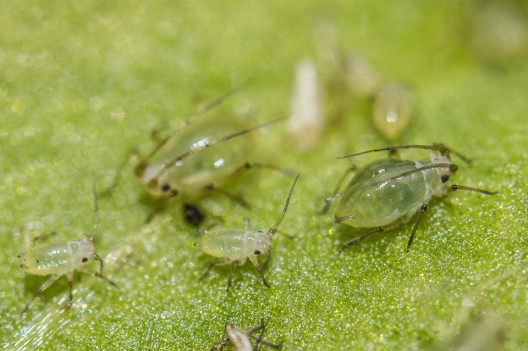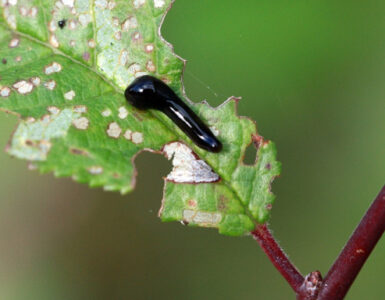Green peach aphids are notorious pests that can cause significant damage to various crops.
These small, yellowish or greenish insects cause direct damage by feeding on plant sap. They can also transmit plant viruses. This further threatens agricultural productivity.
Fortunately, several natural methods are available to manage green peach aphids. In this article, we will explore some natural ways to control these aphids on your plants.
Damage
Before exploring methods to control green peach aphids, it is essential to understand the damage they can cause. Green peach aphids can harm plants in several ways.
These pests take the sap from plants, which can cause the plants to grow slowly and the leaves to curl. The pests may also make the fruits look weird or misshapen [1].
Aphids can transmit plant viruses, too. They are known for spreading diseases such as beet mosaic and potato leaf roll [2].
Infestations can lead to significant yield losses and reduce the quality of crops.
Host Plants
Green peach aphids will feed on a wide range of plants. These include tobacco, nectarines, almonds, papaya, and peaches.
They will also attack various vegetables, such as potatoes, tomatoes, cabbage, and peppers.
Understanding the host plants of these pests is key to controlling them. This is especially vital in mixed cropping systems where multiple susceptible plants are grown close to each other.
How to Get Rid of Green Peach Aphids Naturally
Below are some home remedies and eco-friendly techniques to help keep your garden aphid-free.
1. Remove Old Crop Debris from the Field
A natural way to cut down green peach aphid numbers is to keep fields and gardens clean.
Therefore, remove old crop debris where most aphids overwinter. Doing so can help disrupt their life cycle.
It will also lower the chances of aphid problems in the next growing season.
2. Sticky Traps
Sticky traps are another natural method for managing green peach aphids and other tiny pests. These traps consist of bright yellow boards or tapes coated with a sticky substance.
When the pests land on the trap, they will become stuck, preventing them from further infesting plants.
Therefore, place sticky traps in your garden. Focus on areas near plants that often get aphids.
Moreover, these traps are great for both indoor and outdoor use.
3. Prune and Thin Plants
Pruning and thinning plants can also help control aphids.
Pruning can help remove infested plant parts. This prevents the spread of pests to healthy areas of the plant.
Thinning and pruning also improve airflow and give pesticides better access.
4. Water Pressure
This method is a simple yet effective way to control small insect pests on plants.
Just spray the affected plants with a strong jet of water. Doing so dislodges the aphids from the plants, reducing their numbers.
Repeat this process regularly to keep aphid populations in check.
5. Reflective Mulches
Things like aluminum foil and other reflective materials can be effective in repelling green peach aphids.
These shiny surfaces disorient aphids by reflecting light, making it difficult for them to locate host plants.
Many farmers have found this method to be effective in tomato and pepper fields.
6. Control Weeds
Weeds can serve as alternative hosts for these little critters. They can provide them with shelter and a food source when preferred plants are scarce.
So, by keeping your garden free of weeds, you can reduce aphid numbers.
Regularly remove weeds from your garden beds and surrounding areas. Doing so will minimize the pests’ ability to spread to desirable plants.
7. Natural Predators
Encouraging the presence of natural predators is another natural way to control green peach aphids.
Ladybugs, lacewings, praying mantises, and hoverfly larvae are helpful insects. They all eat aphids.
To attract and retain these natural enemies, it is essential to provide habitat diversity. This includes flowering plants for nectar and pollen.
Yes, you can attract many helpful insects by planting plants and flowers that insects like. These plants and flowers will attract insects that are good for your garden.
Also, avoid using broad-spectrum insecticides. These kill not only pest insects but also helpful insects.
8. Insecticidal Soap
Insecticidal soap is a safe and effective way to manage green peach aphids organically.
It works by disrupting the aphids’ cellular membranes. This ultimately leads to their death.
It also works against pests like mealybugs, mites, and earwigs. You can easily buy this product online or at specific garden centers.
You can also make a homemade insecticidal soap spray.
Just combine a tablespoon of mild liquid soap with a quart of water. Next, shake it up and use it. It’s that simple!
9. Pyrethrin
Pyrethrin comes from certain types of chrysanthemum flowers. It is often used as a natural insecticide.
This insecticide helps control aphids, mosquitoes, moths, and many other annoying insects.
It works by disrupting the nervous system of aphids. This leads to these pests becoming paralyzed and then dying.
Moreover, it’s available in different forms, like sprays and dust. This makes it easy for gardeners to apply directly to affected plants.
10. Horticultural Oil
Horticultural oils can help control aphids by suffocating them. Neem oil works similarly.
These oils can be applied directly to plants affected by aphids. However, ensure that the spray comes into direct contact with the critters.
When using horticultural oils, make sure to cover both the top and bottom of the leaves thoroughly. Aphids often hide in these areas. But you may need to apply the oil more than once.
Also, be sure to follow the manufacturer’s instructions when applying horticultural oils to prevent damage to your plants.
11. Companion Planting
Companion planting, in this sense, involves growing certain plants together to help deter pests. Some plants, like rosemary, thyme, basil, and garlic, are good at repelling peach-potato aphids.
Therefore, add these plants to your garden. They will help reduce the number of greenflies.
Takeaway
Green peach aphids can be a nuisance in the garden. However, as you can see, you can effectively manage the critters using natural remedies that are safe for the environment.
No, you don’t have to rely on harsh chemical pesticides to control them. You can keep pests under control by introducing beneficial insects, using DIY remedies, applying horticultural oils, and other methods.
With a little effort and persistence, you can keep your plants thriving and aphid-free naturally.








Add comment